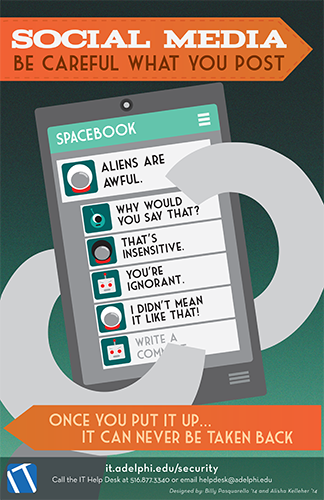Make sure to keep as much information about you private.

Have you seen this poster around Adelphi? It was co-designed by Alisha Kelleher ’14 and William Pasquarello ’14.
Social Media sites allow you to share your personal information with a group. What you leave behind on these social media sites is called a digital footprint. And once information is posted it is no longer private. Even if you are using high security settings, your information can still be shared by websites and sometimes inadvertently by your friends.
Certain web applications and smartphone application ask permission you access your Facebook account. Sometimes, these applications that are downloaded include malware and viruses that are used to retrieve private information from you and your friends. In March 2011, Google removed 60 applications from the Android Market that were carrying malicious software designed specifically to steal your personal data.
According to the U.S. Securities and Exchange Commission, Facebook said that as of June 30, 2012, there were 83 million fake accounts on the site. This alone should make you think twice when accepting friend requests from someone you don’t know. Unfortunately, there are people who want to steal your information. The Federal Bureau of Investigations has categorized two kinds of hacker who want to steal your information.
-
Experienced hackers who write and manipulate computer code in order to gain access or install malware on your computer or smartphone.
-
Social or human hackers who exploit personal information and connections through social media. These hackers use your information or your friends information and use it to steal identities.
Make sure to keep as much information about you private. Information as simple as your phone number, your address, and even your pet’s name can be used to get into your accounts. Hackers use this information to get past firewalls, impersonate you, and get information from your friends.
It’s important to keep your presence on social media neutral and uninformative. Make sure to only accept friend requests from people you know and never download a smartphone application that could contain suspicious malware. Make sure your digital footprint can’t be used against you.
Have a story about ID theft or other problems as a result of social media? Share it with us anonymously. Your experience might help someone else prevent a similar problem.For further information on security issues:
Visit our IT security site for more topics at it.adelphi.edu/security.
Live chat with a Help Desk rep at chat.adelphi.edu.
Email your issue to helpdesk@adelphi.edu or call 516.877.3340.
National Cyber Security Awareness Month is an initiative launched by the U.S. Department of Homeland Security. Aligning with this campaign, Adelphi IT urges everyone at the University to take responsibility for protecting your digital resources, whether personal, academic, or professional.
For further information, please contact:
Todd Wilson
Strategic Communications Director
p – 516.237.8634
e – twilson@adelphi.edu